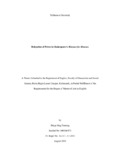Please use this identifier to cite or link to this item:
http://eibrary.ratnarajyalaxmicampus.edu.np:8080/handle/123456789/18| Title: | Delegation of Power in Shakespeare's Measure for Measure A |
| Authors: | Subba, Motikala Dewan Tamang, Durga Sing |
| Keywords: | M.A. English |
| Abstract: | The study on Shakespeare's Measure for Measure manifests delegation of power between manager and subordinate. The power delegation flows from the Duke to Angelo as there was anarchy, violation of law and prostitution, lack of peace and order in Vienna as Duke find Angelo is the right person to implement the rules and regulation strictly as he is a determined person. This play demonstrates the unproven and inexperience consequence to overcome with the situation as the Duke finds himself inefficient for the ruler to bring order and harmonious progress through this play. Duke does not like to enforce law against the will of people where he has allowed freedom that result the violation of law, anarchy and instability of social condition. With the expectation of bringing social stability, peace, security Duke assigned the responsibilities to a strict ruler Angelo. First he arrests Claudio in accusation of involving in unlawful act of sex with Juliet. Isabella, sister of Claudio, request Angelo to free her brother but he blackmails her with the proposal of having physical relationship with him which she directly refused. Disguising himself as friar Duke observes the socio-political situation of the country and finds that there is still the problem in the nation so he reveals his dual identity towards the end of the play that forces everyone to be honest and Angelo confesses to his misdeeds of arresting Claudio and blackmailing Isabella. Duke sets free to Claudio and asks Isabella to marry with him. Hence, Measure for Measure highlights the delegation of power. |
| URI: | http://202.45.147.228:8080/handle/123456789/18 |
| Appears in Collections: | Theses |
Files in This Item:
| File | Description | Size | Format | |
|---|---|---|---|---|
| 400144_Tamang_DurgaSing.pdf | 282.09 kB | Adobe PDF |  View/Open |
Items in DSpace are protected by copyright, with all rights reserved, unless otherwise indicated.
